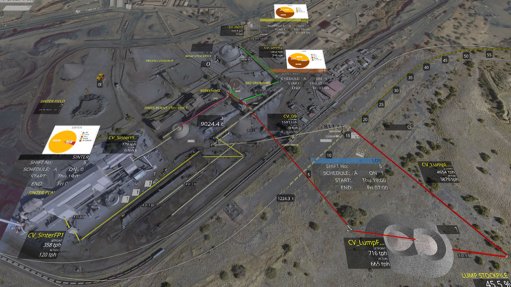
ORE TESTING Bypassing ore testing results in unsatisfactory design of materials handling equipment
Testing ores is necessary so that bulk handling and logistics processes run smoothly in the mining material bulk handling and logistics industry, says mining operations support company Isithelo Mining Consultants & Services director Jose Prozzi.
The key to an efficient materials and bulk handling system is the inspection and review of infrastructure, with special attention being paid to components such as conveyor belts, loaders, shovels and transfer points.
Transfer points, where the material is moved from one conveyor belt to the next, become more critical when the materials they convey change – such as when conveying wet or dry ores – and as such chutes, bins and conveyor belts require more frequent inspection and maintenance, he adds.
Prozzi highlights that mining companies need to know their ore in terms of its properties, such as particle size distribution, water content, cohesivity and binding, to gain a better understanding of how they will be handled by a materials handling system.
Further, national mineral research organisations such as Mintek and non-profit conveyor industry custodian the Conveyor Manufacturers Association of South Africa provide mines with useful information on how to design materials handling equipment.
However, Prozzi adds that miners often bypass having their minerals tested, potentially resulting in materials handling equipment being used to unsatisfactory design specifications and consequently performing poorly.
He emphasises that ongoing testing of ore materials is critical to designing the plan for materials handling and sorting processes, but a lack of knowledge about the importance of testing and analysis and continuous changes in properties of minerals is causing inefficiencies in materials handling and logistics chains.
Although there are “plenty of opportunities” to improve accuracy during inspections regarding equipment maintenance in the materials and bulk handling industry, few people who have the required skills and experience are entering the market because most mines maintain their own equipment using in-house personnel.
Prozzi says that while mining companies maintain their equipment as it is the bedrock of operations, maintenance opportunities are often not awarded to specialist providers, owing to mines’ being “reluctant to adopt new ways of doing things”.
He stresses that preventative maintenance is key to prolonging the longevity of materials handling equipment.
However, challenges are often encountered while undertaking maintenance work on such equipment, owing to its extensive length and numerous movable components, which make it difficult to capture the associated data and use it for fault finding.
Isithelo has worked with mining companies such as Anglo American’s Isibonelo coal mine in Mpumalanga, Sishen and Kolomela iron-ore mines in the Northern Cape, Pretoria-based minerals processing techniques specialist Tugela Mining and Minerals, and the Mafube Coal 50:50 joint venture operation between Exxaro and Thungela Resources to help them make their materials handling and equipment maintenance operations more efficient, and their equipment better performing with less downtime.